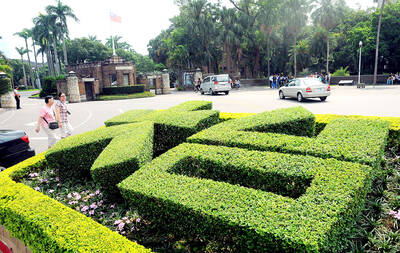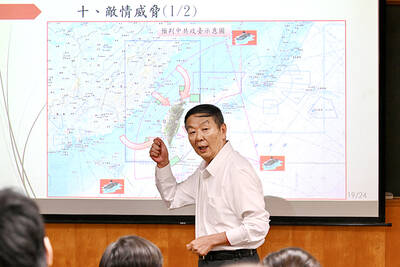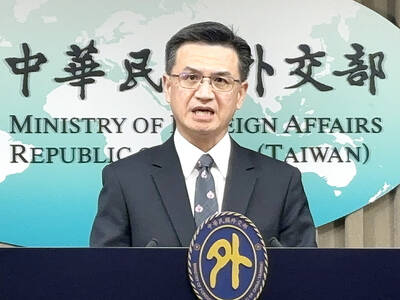Minister of Justice Tsai Ching-hsiang (蔡清祥) yesterday said that the authorities would respect the rights of the accused, after the family of a Malaysian student who was killed last month called for the death penalty or extradition, as well as state compensation.
The parents of the victim, a Chang Jung Christian University student surnamed Chung (鍾), on Monday convened a news conference in Sarawak, Malaysia, to announce their plan to sue for negligence and compensation.
They said they have enlisted Taiwan Bar Association president Lin Ruey-cherng (林瑞成) to file the suit on their behalf in Taiwan.

Photo: CNA
The family’s lawyer in Malaysia, Yap Hoi Liong (葉海量), said that if Taiwan does not sentence the accused to the fullest extent of the law, then the family would do whatever it takes to extradite him to the Southeast Asian nation to stand trial.
Lin yesterday declined to comment, saying only that he would begin discussions regarding state compensation after the investigation closes.
Tsai told the Central News Agency that he can understand the family’s wishes, but must also respect the rights of the accused, Kaohsiung resident Liang Yu-chih (梁育誌), who allegedly confessed to the murder during questioning on Oct. 30.
As for extraditing Liang to Malaysia, Tsai said that whatever actions are taken must follow legal precedent.
Liang is to stand trial in Taiwan, and the prosecution is to investigate and recommend punishment according to the law, he added.
Regarding compensation, Tsai said that such lawsuits follow a designated procedure.
The Ciaotou branch of the Association for Victims Support took action immediately after the incident, helping Chung’s parents travel to Taiwan, Tsai said, adding that the government-sponsored association offers compensation similar to that distributed by the state.
The association told local media that it has not yet received an application for compensation from Chung’s family, which is estimated by some law experts to be about NT$1.7 million (US$58,964).
Asked about the family’s demands, Premier Su Tseng-chang (蘇貞昌) told reporters that the murderer would be punished severely in accordance with the law.
Everyone is aware that under the rule of law in Taiwan, people who commit a crime within the nation’s borders are strictly dealt with according to the law, he said.
Su added that he sympathizes with the family and again offered his apologies, saying that the murderer would definitely receive a severe punishment.
An expert familiar with international legal assistance said that Taiwan has jurisdiction over this case.
Taiwan and Malaysia do not have extradition treaties or provisions, the expert said, adding that such a request would be denied under Article 4 of the Law of Extradition (引渡法), which protects Republic of China citizens from extradition.
State compensation follows the principle of advance negotiation, meaning that the compensatory authority — in this case the Tainan City Government — must first negotiate with the family of the victim, they said.
Only if they fail to reach an agreement would the matter enter litigation, they added.
Yesterday, Yap said that investigators have yet to contact the family’s legal team, calling on President Tsai Ing-wen (蔡英文) to keep prosecutors from burying the case.
Under Article 15 of the State Compensation Law (國家賠償法), authorities are obligated to communicate with the family, even though they are foreign claimants, Yap said.
The president should ensure that autopsy and post-mortem procedures are reported accurately, Yap said, adding that he hopes the family will receive the investigative report within a month.
Tainan Mayor Huang Wei-che (黃偉哲) later yesterday pledged to assist Chung’s family if they decide to seek state compensation in Taiwan.
Huang added that he hoped the court would hand down a verdict that meets public expectations.

Taiwan has experienced its most significant improvement in the QS World University Rankings by Subject, data provided on Sunday by international higher education analyst Quacquarelli Symonds (QS) showed. Compared with last year’s edition of the rankings, which measure academic excellence and influence, Taiwanese universities made great improvements in the H Index metric, which evaluates research productivity and its impact, with a notable 30 percent increase overall, QS said. Taiwanese universities also made notable progress in the Citations per Paper metric, which measures the impact of research, achieving a 13 percent increase. Taiwanese universities gained 10 percent in Academic Reputation, but declined 18 percent

RETHINK? The defense ministry and Navy Command Headquarters could take over the indigenous submarine project and change its production timeline, a source said Admiral Huang Shu-kuang’s (黃曙光) resignation as head of the Indigenous Submarine Program and as a member of the National Security Council could affect the production of submarines, a source said yesterday. Huang in a statement last night said he had decided to resign due to national security concerns while expressing the hope that it would put a stop to political wrangling that only undermines the advancement of the nation’s defense capabilities. Taiwan People’s Party Legislator Vivian Huang (黃珊珊) yesterday said that the admiral, her older brother, felt it was time for him to step down and that he had completed what he

BULLY TACTICS: Beijing has continued its incursions into Taiwan’s airspace even as Xi Jinping talked about Taiwan being part of the Chinese family and nation China should stop its coercion of Taiwan and respect mainstream public opinion in Taiwan about sovereignty if its expression of goodwill is genuine, the Ministry of Foreign Affairs (MOFA) said yesterday. Ministry spokesman Jeff Liu (劉永健) made the comment in response to media queries about a meeting between former president Ma Ying-jeou (馬英九) and Chinese President Xi Jinping (習近平) the previous day. Ma voiced support for the so-called “1992 consensus,” while Xi said that although the two sides of the Taiwan Strait have “different systems,” this does not change the fact that they are “part of the same country,” and that “external

UNDER DISCUSSION: The combatant command would integrate fast attack boat and anti-ship missile groups to defend waters closest to the coastline, a source said The military could establish a new combatant command as early as 2026, which would be tasked with defending Taiwan’s territorial waters 24 nautical miles (44.4km) from the nation’s coastline, a source familiar with the matter said yesterday. The new command, which would fall under the Naval Command Headquarters, would be led by a vice admiral and integrate existing fast attack boat and anti-ship missile groups, along with the Naval Maritime Surveillance and Reconnaissance Command, said the source, who asked to remain anonymous. It could be launched by 2026, but details are being discussed and no final timetable has been announced, the source